The Samsung 750 EVO (120GB & 250GB) SSD Review: A Return To Planar NAND
by Billy Tallis on April 22, 2016 8:00 AM ESTATTO
ATTO's Disk Benchmark is a quick and easy freeware tool to measure drive performance across various transfer sizes.
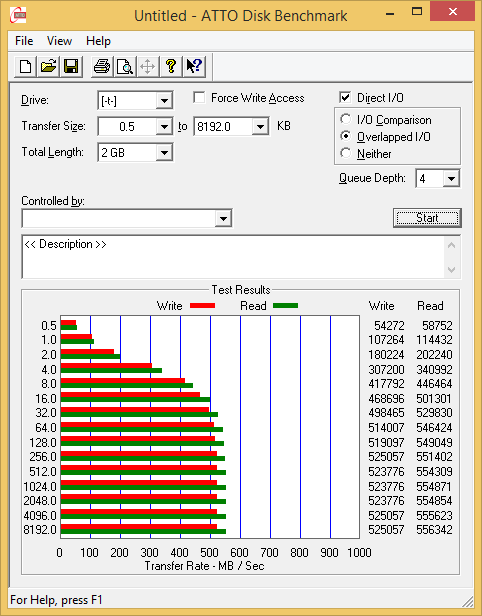 |
|||||||||
The ATTO benchmark shows the 750 EVO has good performance on small transfers and a maximum write speed that is very close to the read speed. The 120GB 750 EVO even provides better write speeds than the 850 Pro 128GB thanks to the former's SLC write caching.
AS-SSD
AS-SSD is another quick and free benchmark tool. It uses incompressible data for all of its tests, making it an easy way to keep an eye on which drives are relying on transparent data compression. The short duration of the test makes it a decent indicator of peak drive performance.
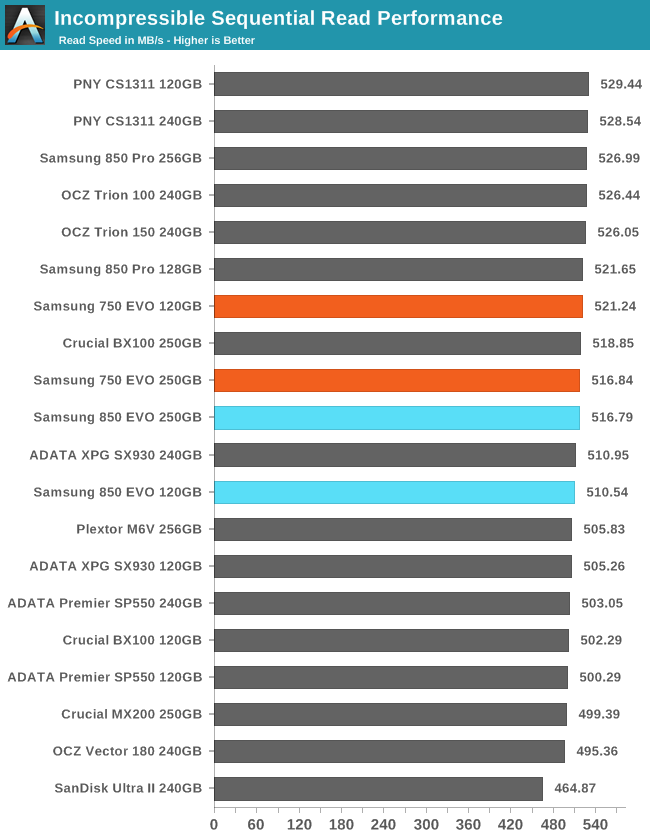
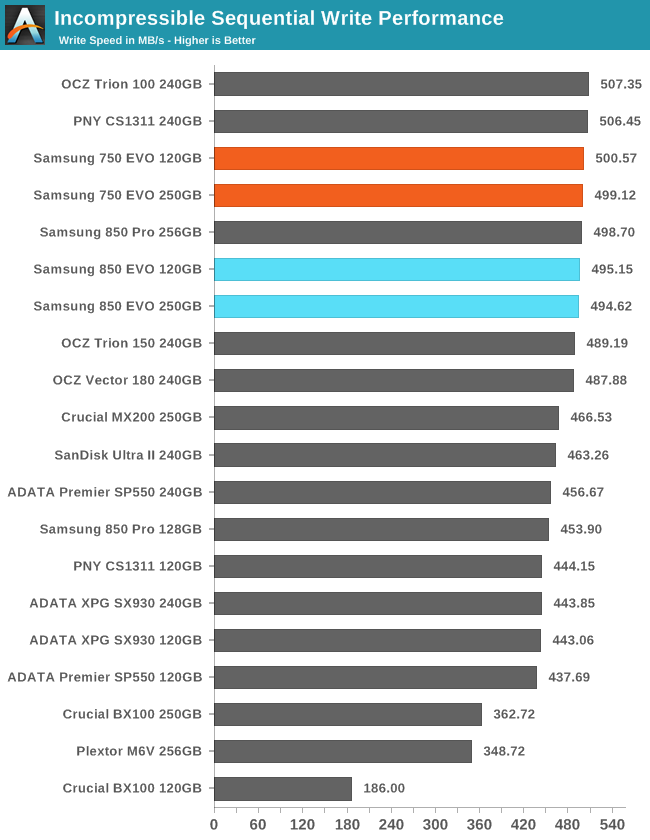
The 750 EVO provides top-notch burst speeds for reads and writes. The write speeds in particular distinguish the 750 EVO from most other TLC drives and low-end MLC drives that suffer from a lack of parallelism at small capacities.
Idle Power Consumption
Since the ATSB tests based on real-world usage cut idle times short to 25ms, their power consumption scores paint an inaccurate picture of the relative suitability of drives for mobile use. During real-world client use, a solid state drive will spend far more time idle than actively processing commands. Our testbed doesn't support the deepest DevSlp power saving mode that SATA drives can implement, but we can measure the power usage in the intermediate slumber state where both the host and device ends of the SATA link enter a low-power state and the drive is free to engage its internal power savings measures.
We also report the drive's idle power consumption while the SATA link is active and not in any power saving state. Drives are required to be able to wake from the slumber state in under 10 milliseconds, but that still leaves plenty of room for them to add latency to a burst of I/O. Because of this, many desktops default to either not using SATA Aggressive Link Power Management (ALPM) at all or to only enable it partially without making use of the device-initiated power management (DIPM) capability. Additionally, SATA Hot-Swap is incompatible with the use of DIPM, so our SSD testbed usually has DIPM turned off during performance testing.
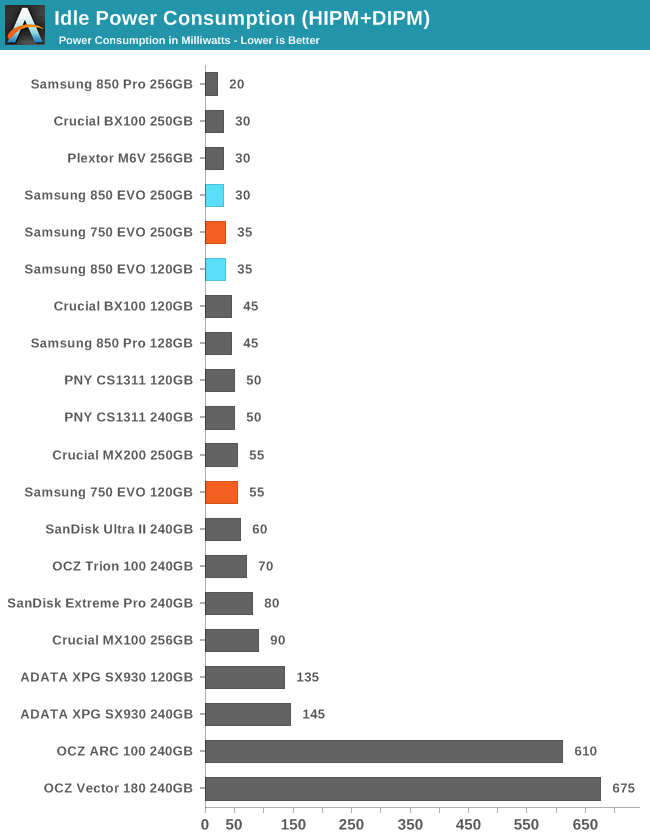
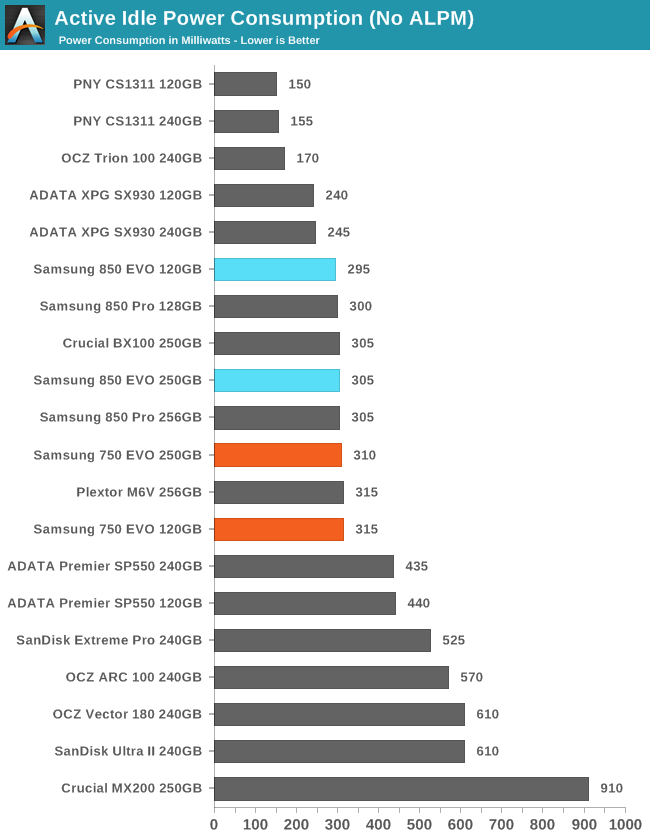
Idle power consumption of the 750 EVO is comparable to other Samsung drives: great when ALPM is enabled, and average when it is disabled.










109 Comments
View All Comments
DanNeely - Friday, April 22, 2016 - link
The cheap SSD will still blow the spinning rust in the other crappy TN 720p laptop out of the water.jabber - Friday, April 22, 2016 - link
Yeah amazing how limited people's imaginations are when it comes to hardware and other peoples usage needs. Unless it's pushing 2GBps it's junk. Tedious people. If every laptop in the world with a cheap 5400rpm HDD in it swapped to one of these 'bottom of the barrel' Samsung SSDs, it would be a revelation. Make my job of support a lot easier and faster.Movieman420 - Friday, April 22, 2016 - link
Keep in mind, launch prices are always a bit high. Sammy could sell em for less at retail...but they're really not after retail with the 750...they wanna move em in bulk minus retail packaging costs. As far as performace, they're just right...for the intended market. As a budget OEM part, the vast majority of end users (80% maybe?) will fall in Anands light bench metric where this drive makes a pretty good showing. Any better would risk cannibalizing EVO sales. Overall, this product and placement was well thought out by Samsung...as usual....and from a performance standpoint a lil over-provisioning goes a long way. I'm assuming it's not compatible with magician's RAPID mode...unless say your a huge oem customer who'd pay a tad extra and make it a performance offering in more expensive lappys with enuff ram.
iwod - Friday, April 22, 2016 - link
What we need to know is final street price, not launch price.Because as it stand i have Zero reason to buy them. It needs at least a 50% price cost.versesuvius - Saturday, April 23, 2016 - link
As long as Samsung is clearing unused chips from its stock, it could just offer these drives for $25 each to make a gesture of good will towards its existing customers and make some new ones too.The_Assimilator - Saturday, April 23, 2016 - link
Good to see you're "revieiwng" this drive. Could you maybe consider reviewing a spellchecker and/or editor in future?zodiacfml - Saturday, April 23, 2016 - link
Cheapest option but purchased separately, $10 difference is not worth it.The perrformance of the 850 is useful for most people savvy enough to replace drtives.
serendip - Saturday, April 23, 2016 - link
$10 may be a big BOM savings for large system builders but it's pocket change for consumers looking to upgrade from a hard drive. This drive probably isn't aimed at you :)I wouldn't trade $10 for half the write longevity and potentially other issues from using planar TLC. The 850 Evo is still the king and the Sandisk Ultra II is also a good deal when it goes on sale.
Peroxyde - Sunday, April 24, 2016 - link
How is the Corsair LE compared to 850 EVO, 750 EVO? In terms of reliability?odedia - Sunday, April 24, 2016 - link
According to Amazon.com, this drive is currently more expensive then the 250gb 850 Evo. Makes zero sense to buy this today. maybe in a year it will be priced accordingly.